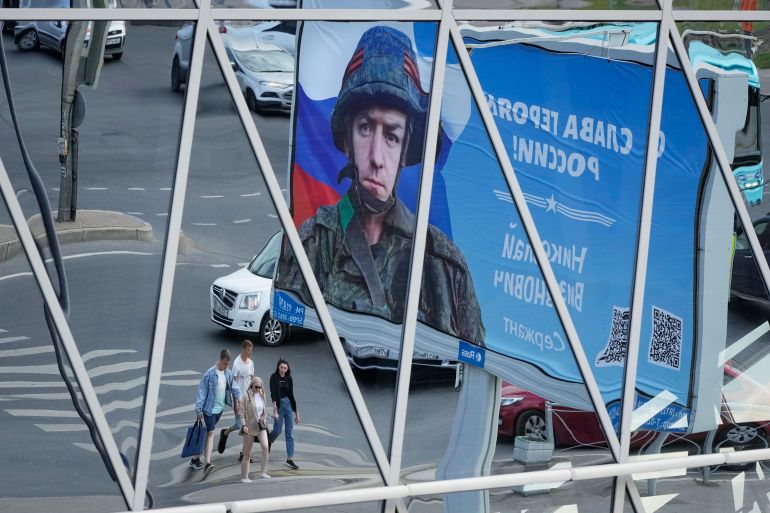US slaps sanctions on Russia technology sector, Ukraine proxies
US added Russian space, technology firms, and the GRU intelligence agency among others to its sanctions list.

The US has imposed sanctions on a long list of Russian officials and companies, ramping up pressure for the invasion of Ukraine while hoping to hobble any attempt to rebuild its heavily damaged defence sector.
Top officials overseeing Russian securities markets operations, a neo-Nazi fighter group, Russian and pro-Russian officials in occupied parts of Ukraine, and a children’s rights official who allegedly directs the removal of Ukrainian children to Russia were all put on the US blacklist on Thursday.
Keep reading
list of 4 itemsDid sanctions really hurt the Russian economy?
Gas flows to Europe won’t resume until sanctions lifted: Russia
US sanctions firms over alleged use of Iranian drones in Ukraine
The GRU intelligence agency and a top economic adviser to President Vladimir Putin, Maxim Oreshkin, were placed on sanctions lists.
In tandem, US sanctions were put on Russian space, computing and technology firms in an effort to cripple Russia’s technology development and stifle its ability to refurbish and modernise its military after broad losses in Ukraine.
Five Russian officials were blacklisted for allegedly supporting or enabling the theft by Russians of Ukrainian grain.
“The United States continues to hold the Russian government to account for its war against Ukraine,” said Secretary of State Antony Blinken.
“Those designated today – from perpetrators of violence to an official facilitating the purposeful removal of children from Ukraine – provide examples of the behaviour that has become synonymous with the government of Russia’s unprovoked war,” he said.
‘Patriotic education’
US Treasury sanctions aim to freeze any assets those designated might have under US jurisdiction and forbid any US individuals or companies – including international banks with US operations – to do business with them, effectively limiting their access to global financial networks.
The sanctions singled out justice officials in occupied Crimea and members of Chechen Republic leader Ramzan Kadyrov’s family, including three of his wives.
The Treasury blacklisted Maria Alexeyevna Lvova-Belova, Russia’s presidential commissioner for children’s rights.
Working directly under Putin, the Treasury said, Lvova-Belova has overseen the deportation of thousands of Ukrainian children to Russia.
“Lvova-Belova’s efforts specifically include the forced adoption of Ukrainian children into Russian families, the so-called ‘patriotic education’ of Ukrainian children, legislative changes to expedite the provision of Russian Federation citizenship to Ukrainian children, and the deliberate removal of Ukrainian children by Russia’s forces,” it said.
The Treasury also put sanctions on Task Force Rusich, a neo-Nazi paramilitary group fighting in Ukraine and associated with the Wagner mercenary army controlled by close Putin adviser Yevgeny Prigozhin.
Targeting Russian tech
The US also stepped up its efforts to cut off Russian industry and particularly high-technology entities from the global market, seeking to deprive them of capital and components from abroad.
The State Department put 31 companies on its sanctions list, including three involved in building space instrumentation, satellites and space-defence equipment.
Others on the list are involved in semiconductor development, nanotechnologies, quantum computing and engine technologies.
In addition, the US Commerce and Treasury departments issued bans on the export of quantum computing technology and related software and hardware to Russia and Belarus.
The Treasury said that would degrade Moscow’s ability to rebuild its military after heavy losses in the continuing war.
“As Ukraine presses forward with defending its freedom, today we’re taking steps to further degrade Russia’s ability to rebuild its military, hold perpetrators of violence accountable, and further financially isolate Putin,” said Treasury Secretary Janet Yellen in a statement.
In the Russian financial sector, sanctions included the heads of key institutions including National Payment Card System (NSPK), which runs the Mir payment card network; the National Settlement Depository; Central Counterparty National Clearing Centre (CCP NCC), which manages settlement for the Moscow stock exchange; and the Deposit Insurance Agency.
